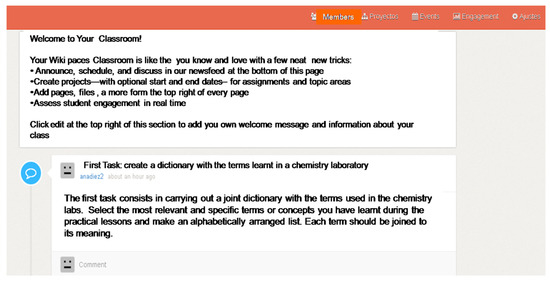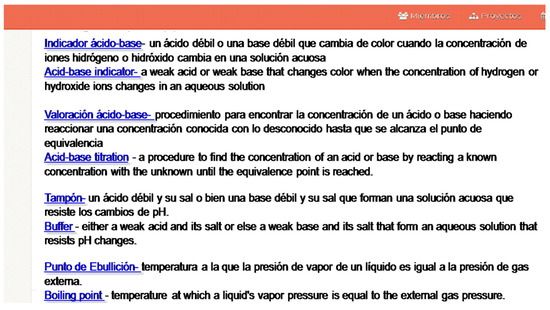Abstract
Wikis are often used to create collaborative websites that allow users to create and modify their content and structure in a simple and quick way; these characteristics make them an effective platform for collaborative writing on a given topic. This article illustrates the experience in the design of a wiki as an educational activity in a practical subject of the degree in Chemistry. This methodology has been used for the elaboration of a dictionary with the conceptual terms learned during the classes. The learning strategy has been constructive, even if the percentage of student participation has been scarce. Consequently, it is necessary to introduce modifications in the design of the activity in order to obtain more satisfactory results.
1. Introduction
A wiki is a collaborative website which allows the users to create and modify its content and structure in an interactive, easy and fast way [1]; these characteristics make it an effective platform for collaborative writing, where the members collaborate to develop contents on a given topic. The wikis belong to the same group of tools for collaborative learning as the blogs, though there are important differences between them related to notification of new content, editing format, and structure. A blog typically has a single author or editor, who includes the contents he/she considers interesting, which are then commented by the readers. However, in a wiki every member can edit the contents and participate in the discussion. Mattison [2] affirms that “a wiki can be a blog, but a blog does not have to be a wiki”. The use of wikis is often compared with blogging. Blogs are arranged chronologically, while wiki structure can be based on hierarchical subject divisions through new page creation and internal and external hyperlinking. These features make wikis highly suitable for educational use. Blogs are more structured, whilst wikis are more flexible. Most wikis include a search feature, whereas many blogs do not. Once a blog addition is posted, it often cannot be edited. User communities are found at both blog and wiki sites.
The wikis applied to teaching allow the students to show their achievements during the learning process [3]. Further, the positively contribute to the teaching-learning process by boosting important functions such as: motivation of the students to carry out activities related to the subject, encouragement of the autonomous or “self-learning”, establishment of a direct communication line between the teacher and the students out of the class and continuous formative evaluation [4].The websites more widely used for the development of wikis within the education field are: PBworks, Wetpaint, Wikia, Google Sites and Wikispaces. All of them employ free web services and a remote server transparent to the users. For the design of our wiki, we employed Wikispaces, a service launched by Tangient LLC in 2005 and bought by Wikispaces TSL Education in 2014 (Figure 1).

Figure 1.
Wikispaces image (taken from the web www.wikispaces.com).
The activities described herein refer to Wikispaces, though it is possible to carry out the same activities using any other wiki service. The teacher showed the students the activity they had to accomplish using the wiki in order to make them understand the aim of the activity and its dynamics. The activity belongs to a practical compulsory course of the degree in Chemistry in Alcalá University (Madrid, Spain).
2. Aims
- Analyze the potential of the wikis within the framework of the University Education.
- Evaluate an experience of the use of wikis in the field of experimental science.
- Encourage both the autonomous and collaborative work within the students. Be able to coordinate and distribute their tasks as well as arrange their time.
- Initiate the students in the bibliographic search of information, learn and actualize knowledge.
- Promote the appropriate use of the new technologies.
- Encourage their capacity of discussion and critical logic, selection and synthesis.
3. Design and Implementation of the Wiki
The degree in Chemistry includes specific laboratories that consist in practical lessons imparted in small groups where the students develop experiments to apply the basic concepts learnt in the theoretical classes.
The aim of these laboratories is to initiate the students in the methodology of the scientific process and make them able to develop scientific criteria for the evaluation of chemical results. The team-work and the knowledge of the instruments and equipments frequently used in chemistry labs are among the specific competences the students have to attain. To reach such competences it is essential to get used to the specific terminology of the area, hence it is important to carry out activities in which they use such terms. An appropriate environment for such development is a wiki, where the students can edit and revise the team-work, which boosts both the autonomous learning and the collaborative work [5]. These types of activities allow carrying out tasks that could not be performed during the lessons due to the lack of time and their practical character.
Figure 2 shows the first page that every member finds when entering the wiki. It comprises two sections: contents and discussion or comments areas. In the first one, the teacher presents the activity to be carried out. In the second, all the members can insert comments related to the activity. It is a zone for collaborative discussion, both among students and between the students and the teacher. Within this environment, the teacher can suggest ideas and comments to improve the quality of the end product. Before starting the activity, the teacher imparted a seminar in order to explain the students the way of using the wiki within the Wikispaces environment. The activity consisted in carrying out a joint dictionary among all the students. They had to select the most relevant and specific terms or concepts they had learnt during the practical lessons and make an alphabetically arranged list. Each term should be joint to its meaning, similarly to Wikipedia. The dictionary should be polyglot, with definitions in Spanish and English. Prior to perform the activity, they should check for literature [6]. The teacher provides comments throughout the wiki, thus the students can enhance the contents as the course advances.

Figure 2.
First page of the wiki activity developed for the students.
4. Results
Once the wiki was made, the first members that entered the page did not understand correctly the activity and just incorporated terms without their definition. Then, other members started the preparation of the dictionary, and inserted the meaning of each word in both languages as requested. Other students sorted the concepts by alphabetical order. Figure 3 shows a fragment of the joint dictionary developed by the wiki members. Periodically, the teacher made some corrections and published the corresponding comments.

Figure 3.
Fragment of the joint dictionary prepared by the wiki members.
Table 1 summarizes the statistics of participation in the wiki. As can be observed from the table, the percentage of participation in the wiki was scarce (5.2%). All the members of the wiki passed the final exam of the subject. Besides, 15.6% of the students that passed the exam were members of the wiki. Further, we found that the students spent between 1 and 6 h working on the activity of the wiki, depending on degree of involvement.

Table 1.
Statistics of participation of the students in the wiki.
5. Conclusions and Future Perspectives
All the students that participated in the wiki passed the subject. Since the activity was optional, only the students more committed with the subject were involved in the wiki. The non-compulsory character of the activity boosts an improved management of the learning process by the students, who can focus their efforts on what they write and not on the mark. The scarce level of participation could be related to their lack of time and the lack of flexibility of the activity. The continuous evaluation causes overlapping of the activities recommended for the different subjects, which became coincident within the most intense periods. In order to avoid this situation, flexible criteria and deadlines for working with the wiki should be stablished, in agreement with the students.
It would be also beneficial to propose different activities to the students so that they can select those they consider more interesting, including: (1) an analysis of a scientific document in the area of chemistry. The students should carefully read the document and analyze the aims, methodology, results and conclusions. (2) Writing on a current topic related to the subject so that the students could apply their knowledge and the specific terms they had learnt. It is a collaborative writing, hence the students would have to coordinate themselves. (3) Answer to specific questions related to the field of the subject. Some of them would be numerical problems.
Author Contributions
The three authors designed the experiments; A.M.D.-P. performed the experiments; P.G.D. and R.P.C. analyzed the data; A.M.D.-P. wrote the paper.
Acknowledgments
The authors wish to acknowledge Alcalá University (Madrid, Spain) for support via project UAH/EV906.
Conflicts of Interest
The authors declare no conflict of interest.
References
- Leuf, B.; Cunningham, W. The Wiki Way: Quick Collaboration on the Web; Addison-Wesley Longman Publishing: Boston, MA, USA, 2001. [Google Scholar]
- Mattison, D. Quickiwiki, Swiki, Twiki, Zwiki and the Plone Wars: Wiki as a PIM and Collaborative Content Tool. Searcher 2003, 11, 32–48. Available online: http://www.infotoday.com/searcher/apr03/mattison.shtml (accessed on 7 July 2018).
- Zheng, B.; Niiya, M.; Warschauer, M. Wikis and collaborative learning in higher education. Technol. Pedagog. Educ. 2015, 24, 357–374. [Google Scholar] [CrossRef]
- Wenger, E. Supporting Communities of Practice: A Survey of Community-Oriented Technologies. 2001. Available online: http://www.ewenger.com/tech (accessed on 7 July 2018).
- Apotheker, J.; Veenstra, I. Twenty-first Century Skills: Using the web in Chemistry Education. In Chemistry Education: Best Practices, Opportunities and Trends; García-Martínez, J., Serrano-Torregrosa, E., Eds.; Wiley: Berlin, Germany, 2015; pp. 563–594. [Google Scholar] [CrossRef]
- Valcarcel, M. Principles of Analytical Chemistry; Springer: Berlin, Germany, 2000. [Google Scholar] [CrossRef]
Publisher’s Note: MDPI stays neutral with regard to jurisdictional claims in published maps and institutional affiliations. |
© 2018 by the authors. Licensee MDPI, Basel, Switzerland. This article is an open access article distributed under the terms and conditions of the Creative Commons Attribution (CC BY) license (https://creativecommons.org/licenses/by/4.0/).